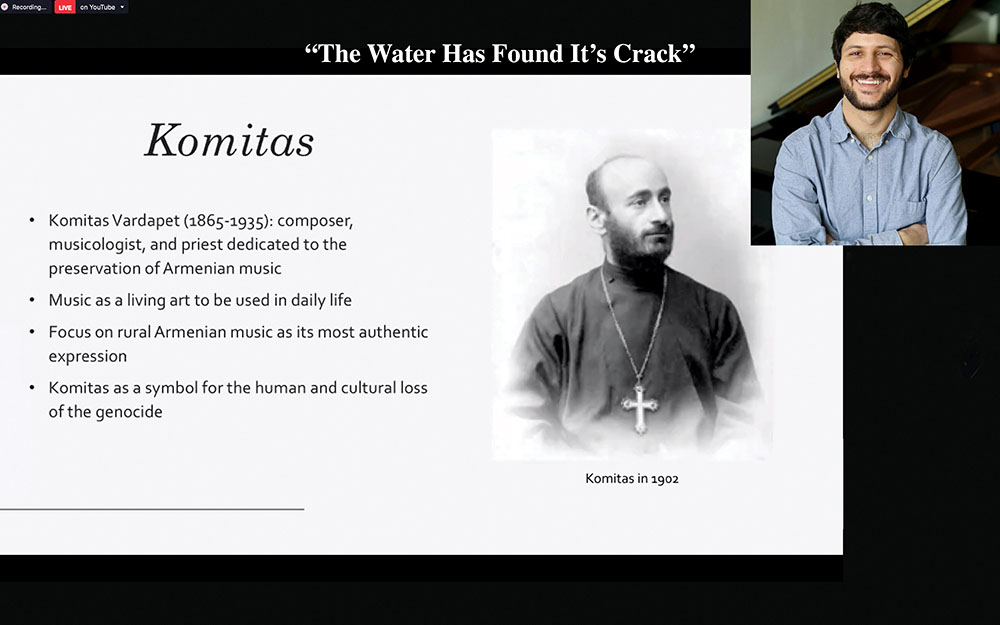
“The Water Has Found Its Crack.” Photo: ASP Archive
Sosse Baloian
Staff Writer
In a 2005 article written by Agos newspaper editor Hrant Dink, a French-Armenian woman passed away while visiting her childhood village in Turkey. When the question arose of where her burial ought to take place, a villager responded, “Let her be buried here… the water has found its crack.” This story embodies the Armenian longing for reunification with the homeland, not necessarily to reclaim it, but “to be buried under it,” according to Dink.
This account inspired the title of Dr. Joseph Bohigian’s doctoral composition, “The Water Has Found Its Crack.” On February 19, 2021, a Zoom audience enjoyed an enlightening virtual presentation from Dr. Joseph Bohigian explaining his composition. Dr. Bohigian’s presentation, “‘The Water Has Found Its Crack’: Finding Armenia Through Music,” was organized by the Armenian Studies Program as part of its Spring Lecture series.
Dr. Bohigian graduated from Fresno State in 2015 with a bachelor’s degree in Music Composition and a Minor in Armenian Studies. He completed his doctorate in music through the Stony Brook University (New York) Department of Music. As an Armenian-American from the diaspora, his works express themes of exile, cultural reunification, and identity maintenance. Dr. Bohigian’s compositions have been performed at the Oregon Bach Festival, Walt Disney Concert Hall, Aram Khachaturian Museum Hall, and several other venues.
Dr. Bohigian explained that a sense of longing pervades the psyche of Armenians living in the diaspora. “This longing motivates the need that Armenians display for reunification, if not physically then at least spiritually,” said Dr. Bohigian. As a great grandson of genocide survivors, Dr. Bohigian was well acquainted with the burden of displacement that came with being an American-Armenian. On a journey to confront his feelings of cultural detachment, Dr. Bohigian traveled to Armenia in 2019 and worked at the Komitas Museum Institute in Yerevan.
Komitas Vardapet lived during the late 19th and early 20th centuries and was dedicated to preserving Armenian music as a living art meant to be used in daily life.
Dr. Bohigian found a recurring theme of dispossession in Komitas’s collected works, including a genre of migrant folk songs which demonstrated a longing for homeland. These folk songs utilized water as a metaphor for distance, longing, and loss.
Dr. Bohigian calls his composition, “The Water Has Found Its Crack,” a “musical manifestation of [his] exploration of Armenian identity.” His piece is written for three soprano vocalists, violin, viola, cello, and percussion. The lyrics were derived from fragments of eight Armenian folk songs, collected and transcribed by Komitas. The piece is sung slowly and freely and is highly ornamented.
Dr. Bohigian deconstructed his piece explaining its intricate structure and symbolism of displacement, dispersion, and reclamation, meaning either a spiritual or physical re-connection with a lost homeland. The opening of the piece incorporates long slides between notes, called glissandi, which stretch over small pitch ranges. The fluidity of the glissandi is a metaphor for the flow of dispersion from the homeland.
The central section of Dr. Bohigian’s piece is a quasi-folk song reminiscent of the migrant song genre that conveys a longing for the homeland. The piece culminates with the theme of reclamation as expressed through Armenian sacred chant.
Dr. Bohigian remarked that defining what constitutes Armenian music for the purpose of identity preservation can be a controversial topic. “The search for Armenian identity in music has at times led to the exclusion of music shared with other cultures such as the Ottoman era music in which Armenians played an important part,” stated Dr. Bohigian.
He contended that when understanding Armenian music, one must take into consideration the interaction with other cultures at home and in diaspora settings. As a third generation Armenian, Dr. Bohigian relates to the “contrapuntality of exilic awareness.” In other words, his Armenian and American identities exist not in opposition but in conjunction with one another.
Living in Armenia and composing “The Water Has Found Its Crack” helped shape Dr. Bohigian’s sense of identity. “The negotiation of internal and external boundaries is a central feature of identity maintenance for the dispersed,” stated Dr. Bohigian. “Music plays a prominent role in this negotiation as art can bring a sense of belonging to people otherwise disconnected from their culture.”
To listen to “The Water Has Found Its Crack” and Dr. Bohigian’s additional compositions, visit www.josephbohigian.com.
 Hye Sharzhoom Armenian Action
Hye Sharzhoom Armenian Action